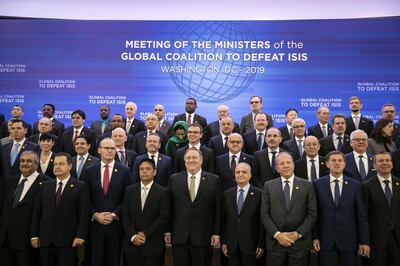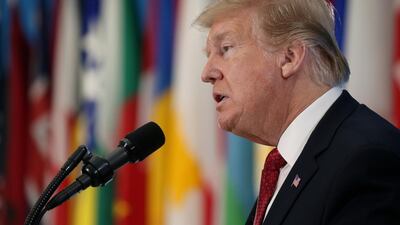US President Donald Trump predicted that ISIS will lose all its territory in its former so-called Caliphate next week, but warned of “dangerous remnants” from the group.
Addressing anti-terror global coalition members who gathered in Washington on Wednesday, Mr Trump said that the extremist group is “decimated” because of a plan that his administration put in place when he came to office in January 2017.
“When I became president it was a mess,” he said, explaining that he asked the Pentagon to put together a plan to directly confront the group and enable US partners on the ground in Iraq and Syria.
As a result, two years later, Mr Trump says ISIS territory will be completely lost by next week.
"It should be formally announced sometime next week that we will have 100 percent of the caliphate. I want to wait for the official word. I don't want to say it too early,” he said.
“The land is gone,” he added, but warned of dangerous remnants of the group.
Mr Trump said “as countries in the region step up their commitments…we look forward to give our troops a warm welcome home” but he did not announce a timeline for withdrawal from Syria.
The US President thanked the UAE, Germany and Saudi Arabia for their increased financial commitments as part of the coalition.
Mr Trump's comments followed on from a statement by his Secretary of State Mike Pompeo, reassuring the 79 nations represented at the event that the US is still leading the fight against ISIS.
Hosting officials from the alliance in Washington, Mr Pompeo stressed that the United States was not backing out of the fight after President Donald Trump announced the surprise withdrawal of troops from Syria in December.

“We all know why we’re here – ISIS remains a menace, one that it’s our generation’s responsibility to stop,” the top US diplomat said.
“We're entering an era of decentralised jihad and nature of the fight against ISIS is changing so we must be nimble in response,” Mr Pompeo added.
He played down the US planned withdrawal from Syria saying it was a tactical change rather than a retreat in their involvement, adding that: “America will continue to lead in giving those who would destroy us no quarter”.
Mr Pompeo returned to the need for all coalition partners to redouble efforts, work together militarily but also through intelligence sharing, financial and humanitarian assistance and through cooperation to ensure the total eradication of the militant group and its ideology.
Without giving detail, he said that partners need to be able to respond quickly to requests for action in the fight and that these requests would be coming soon.
The US diplomat urged all countries to take back ISIS foreign fighters, prosecute and punish them. America, unlike many other countries, has actively taken custody of US citizens who travelled to Iraq and Syria to join the militant group. The US has also requested custody of non-American nationals who have committed crimes that may be punishable under American law.
This includes two former British nationals, part of a group from the UK dubbed 'the Beatles' accused of the murder of journalists James Foley and Steven Sotloff, and aid workers David Haines, Alan Henning and Peter Kassig. The two suspects are held by Western-backed Kurdish forces in Northern Syria and have been stripped of their British nationality.
Many countries are reluctant to accept the return of captured foreign fighters due to the difficulty in mounting a legal case against them and inadequate laws against nationals travelling abroad to join armed groups. Also, there lingers the question for many counties if they are able to make a successful prosecution of what to do with the former fighters.
On a phone call with reporters about the meeting, a senior US official voiced optimism about the prospects of setting up a “safe zone” on the Turkish-Syrian border that may include an international force.
“We're in closed negotiations with our Turkish counterparts to see what might be possible in terms of a buffer zone that would both protect Turkey's legitimate security concerns about its border, and also protect the partners that we've been fighting with over the course of the last few years. I don’t think we're prepared to comment on what might make up an international force in that safe zone because those conversations haven't been concluded yet,” the official said.
Asked by The National if the US would amend its withdrawal plans were the safe zone talks to fail, the US official said: "I wouldn't want to predict failure given the success of our recent discussions with the Turks. I think we'll remain optimistic that creating this safe zone is in both of our best interests and that we'll be able to get there."
The official said the US administration was “a little surprised by the reaction” by Iraqi leaders to Mr Trump’s recent comments that US troops watch Iran from Iraq. “We look at the influence of Iran across the region, the places where they’re intervening are not exactly an advertisement for good government and prosperous security,” the official said.
Iraqi Foreign Minister Mohamed Al Hakim, speaking after Mr Pompeo, called on countries to help expose ISIS "sleeper cells" in Iraq and restore stability.
He asked coalition members for “complete respect for territorial integrity of Iraq” and that all operations must take place with the knowledge of the government in Baghdad and according to its constitution.
The US official did not put a timeline for US withdrawal from Syria but hinted that American troops presence at Al Tanf base in the east “would be the last place that we would withdraw from, and I think that’s something that has not been scheduled.”
Mr Pompeo also held a morning meeting with the Coalition’s Small Group that includes Egypt, France, Germany, Jordan, Saudi Arabia, the United Kingdom, and the United States. In a joint statement on Syria following the discussions, they recommitted to “efforts to achieve a political solution to the conflict in Syria on the basis of UN Security Council Resolution 2254.”
The group stressed that there is no military solution for Syria and warned “that those who seek to destabilise the region or seek a military solution will only succeed in increasing the risk of a dangerous escalation and wider conflagration in the region."

